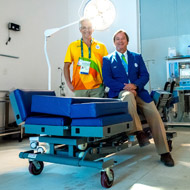
Olympic vets will care for over 200 horses
Horses taking part in Rio 2016 will receive first-class care at a veterinary facility ‘like-no-other’.
According to the FEI, the 1,000 square meter horse clinic features everything needed to keep over 200 horses from 43 countries in top condition throughout the Olympic Games.
Located at the Deodoro stables, the clinic is manned by a 130-strong team of veterinary experts from across the world.
As well as the latest radiography, pathology and endoscopy technology, the clinic also includes a dispensary, specialist treatment stables and a surgery facility with padded recovery boxes.
“Our horses always deserve the very best, and at these first games in South America, they’re getting just that," said Brazil’s Dr Thomas Wolff, President of the Rio 2016 Olympic and Paralympic Veterinary Commission.
He adds: "We know everything about every horse on site every second of the day thanks to our monitoring system, and with the world’s best veterinary care on offer for our horses we’re now very much looking forward to seeing medals won and new Olympic records set in Rio.”
Keeping horses cool will be a major focus for the veterinary team. Every day, over 46,000 litres of water and 400kg of ice to chill the water will be used across the Olympic Equestrian Centre just for washing down horses after training and competition.
Tents containing cooling fans will also be available next to the training and warm-up arenas for jumping and dressage.
Image (C) Arnd Bronkhorst/FEI



 BSAVA is to partner with BVA Live (11-12 June 2026) to champion clinical research.
BSAVA is to partner with BVA Live (11-12 June 2026) to champion clinical research.